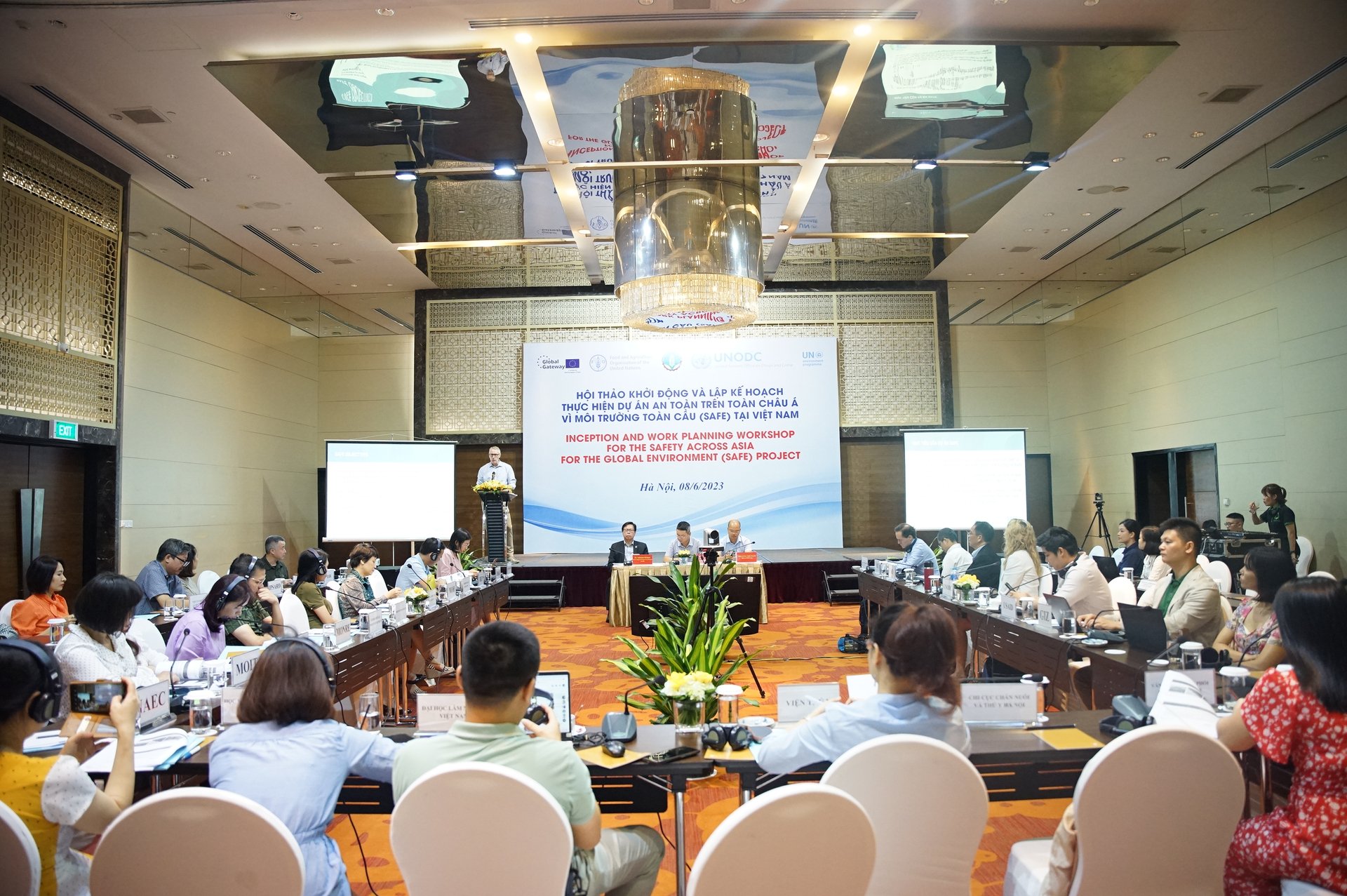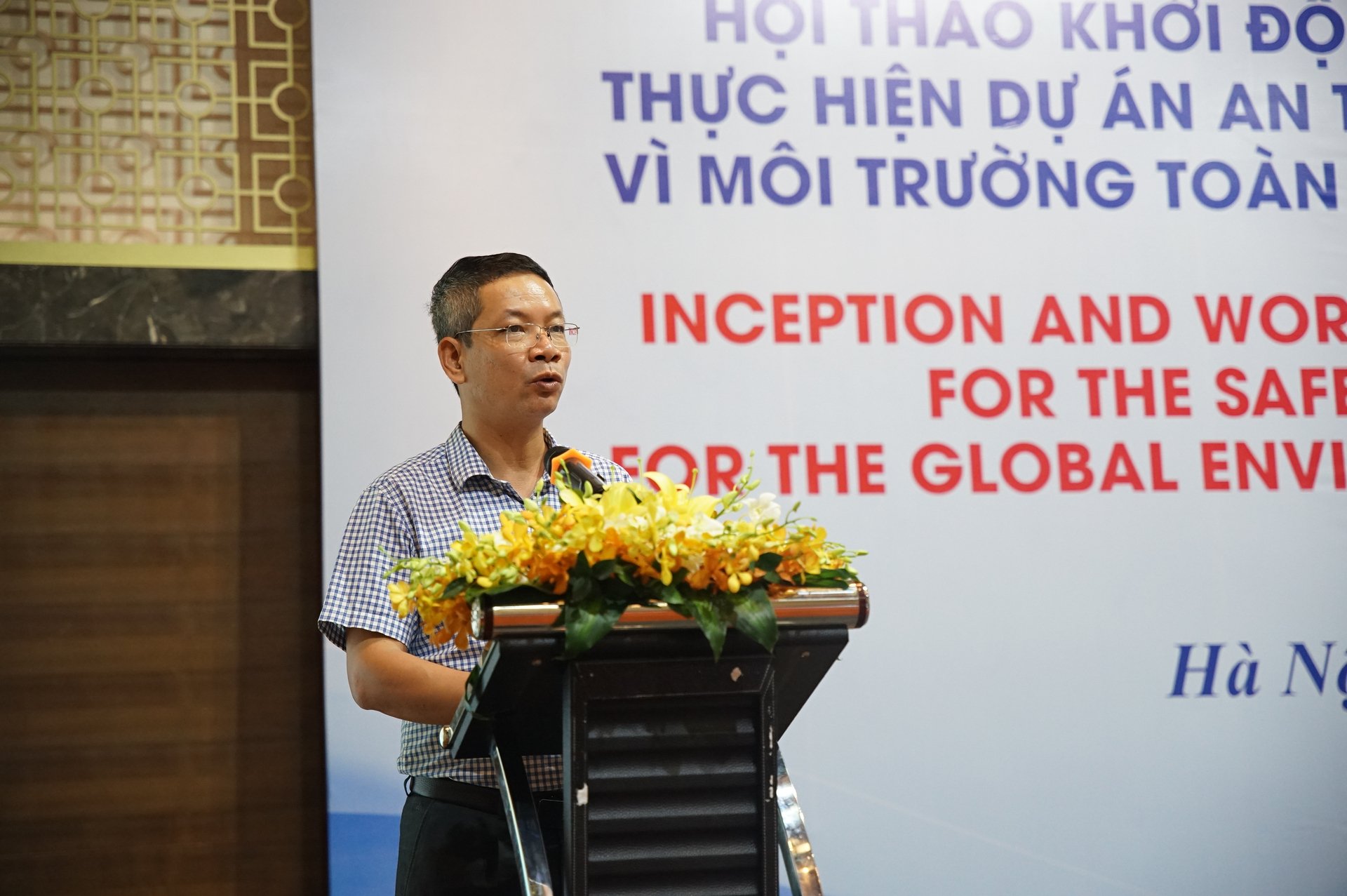June 18, 2025 | 17:40 GMT +7
June 18, 2025 | 17:40 GMT +7
Hotline: 0913.378.918
June 18, 2025 | 17:40 GMT +7
Hotline: 0913.378.918

The SAFE project was conceived with the express objective of reducing the risks of future pandemics by focusing on the health and crime risks associated with wildlife facilities. Photo: Linh Linh.
In recent years, the world has been threatened by the emergence and spread of emerging and re-emerging infectious diseases in humans, domesticated animals, and untamed animals. These diseases are the result of interactions between humans, animals, and ecosystems and have the potential to have devastating effects on human health, livelihoods, economic development, and more. According to scientific evidence compiled by the World Health Organization, approximately 70% of emergent harmful infectious diseases in humans are of animal origin.
The Covid-19 pandemic has increased awareness of diseases transmitted from wild animals to domestic animals and humans, the dangers of consuming bushmeat, and global health security. In contrast, trade in wildlife is becoming an important source for livelihood in many Southeast Asian nations.
Vu Thanh Liem, Deputy Director of the International Cooperation Department (MARD), stated that the EU-funded SAFE project is chaired by the United Nations Office on Drugs and Crime (UNODC), and its co-implementing partners include the United Nations Environment Programme (UNEP) and the Food and Agriculture Organization of the United Nations (FAO).

Mr. Vu Thanh Liem, Deputy Director of the International Cooperation Department (MARD) spoke at the workshop. Photo: Linh Linh.
The Ministry of Agriculture and Rural Development via the Authority to administer the Convention on International Trade in Endangered Species of Wild Fauna and Flora (CITES) as the project proprietor and the International Cooperation Department and One Health Coordinator office are the government partners. The objective of the project is to mobilize multisectoral participation in consultation and cooperation with countries in the region in order to prevent and reduce the risk of disease transmission from untamed animals in wildlife facilities.
Vuong Tien Manh, the Deputy Director of CITES, determined that the initiative is consistent with Vietnam's priorities and policies on wildlife protection in accordance with Directive No. 29/CT-TTg of the Prime Minister on a number of urgent wildlife management solutions. "The initiative employs a One Health approach, mobilizing multi-sectoral and multi-governmental agencies to control and prevent domestic and international wildlife trafficking. Manh stated that the initiative solicits the participation of relevant government agencies in the review of domestic and transboundary wildlife management policies and mechanisms.
In addition, the CITES representative explained that the project's responsibility to control wildlife maladies is one of the six primary duties of the One Health Partnership Framework. "Over the years, the Vietnamese government has bolstered surveillance systems, promoted responsible wildlife trade practices while protecting livelihoods, increased biosecurity on wildlife farms and markets, and raised awareness about zoonotic diseases. This initiative will bolster our efforts and assist us in enhancing the management of captive fauna in accordance with the proposed national plan, as stated by Manh.
Efforts are also being made to strengthen collaboration between the public health, veterinary, and environmental sectors as part of the One Health philosophy. Jenna Dawson-Faber, the coordinator of the UNODC SAFE project, stated, "The SAFE project was conceived with the express purpose of reducing the likelihood of future pandemics by concentrating on health and crime hazards associated with wildlife facilities. Ms. Jenna stated that in order to attain this objective, it is necessary to collaborate and involve all stakeholders.
FAO Viet Nam presented the SAFE project at the One Health Summit in August 2022 and elaborated on it at the pandemic working group (PWG) meeting in January 2023.
The initiative seeks to contribute to the control of illegal wildlife trade and wildlife diseases, as well as to the implementation of best practices throughout the value chain and the production of animal products.
With the start of these activities, Vietnam joins the other SAFE countries of Lao PDR, Thailand and Sabah State of Malaysia in full project implementation. National Advisory Committees have already been established in Thailand and Lao PDR, and data collection is well underway in Thailand and Sabah, with Lao PDR to begin in the coming days.
It seeks to strengthen coordination between government stakeholders (Ministry of Health, Ministry of Natural Resources and Environment, Ministry of Industry and Trade, etc.) and public and private sector stakeholders involved in wildlife value chains and private sector participation in disease control using a One Health approach, thereby strengthening and expanding regional and international cooperation on One Health.
Translated by Dieu Linh
![Turning wind and rain into action: [9] Digitizing hydrometeorological data in response to climate change](https://t.ex-cdn.com/nongnghiepmoitruong.vn/608w/files/news/2025/06/17/z6704423696987_15fd32ffc26d590d204d520c9dac6786-nongnghiep-165943.jpg)
(VAN) Farmers have begun accessing hydrometeorological applications to adjust their cropping schedules, aiming to ensure productivity and adapt to climate change.
![Turning wind and rain into action: [8] Real-time salinity detection and early warning technology](https://t.ex-cdn.com/nongnghiepmoitruong.vn/608w/files/news/2025/06/17/z6704423696987_15fd32ffc26d590d204d520c9dac6786-nongnghiep-151127.jpg)
(VAN) Thanks to the integration of modern hydrological-hydraulic models, remote sensing technologies, and artificial intelligence, the accuracy of hydrological forecasting has significantly improved.
![Turning wind and rain into action: [7] Early disaster warnings help marine farmers minimize losses](https://t.ex-cdn.com/nongnghiepmoitruong.vn/608w/files/news/2025/06/17/z6704423696987_15fd32ffc26d590d204d520c9dac6786-nongnghiep-142942.jpg)
(VAN) In recent years, thanks to early disaster warnings and forecasting, marine farmers in Khanh Hoa province have been able to reduce risks and losses, thereby improving production efficiency.
![Turning wind and rain into action: [6] ‘Four on-the-spot’ disaster management software](https://t.ex-cdn.com/nongnghiepmoitruong.vn/608w/files/news/2025/06/17/e5a48259d6a262fc3bb3-nongnghiep-183800.jpg)
(VAN) By simply activating the scenario on the disaster management software, the relevant authorities immediately know how many households need to be evacuated, where to evacuate them to, and by what means of transportation…
![Turning wind and rain into action: [5] Hue applies modern technology in disaster forecasting](https://t.ex-cdn.com/nongnghiepmoitruong.vn/608w/files/news/2025/06/17/z6704423696987_15fd32ffc26d590d204d520c9dac6786-nongnghiep-093938.jpg)
(VAN) In Hue city, modern technology has recently been applied in meteorological and hydrological forecasting and warning, helping to reduce the damage caused by natural disasters.

(VAN) A cutting-edge farming technique being implemented on an experimental ranch in Arizona's Sonoran Desert has already saved a billion gallons of water over five years, according to Civil Eats.

(VAN) Poultry and pig production and the environment can be boosted through enhanced water technology, according to new research.